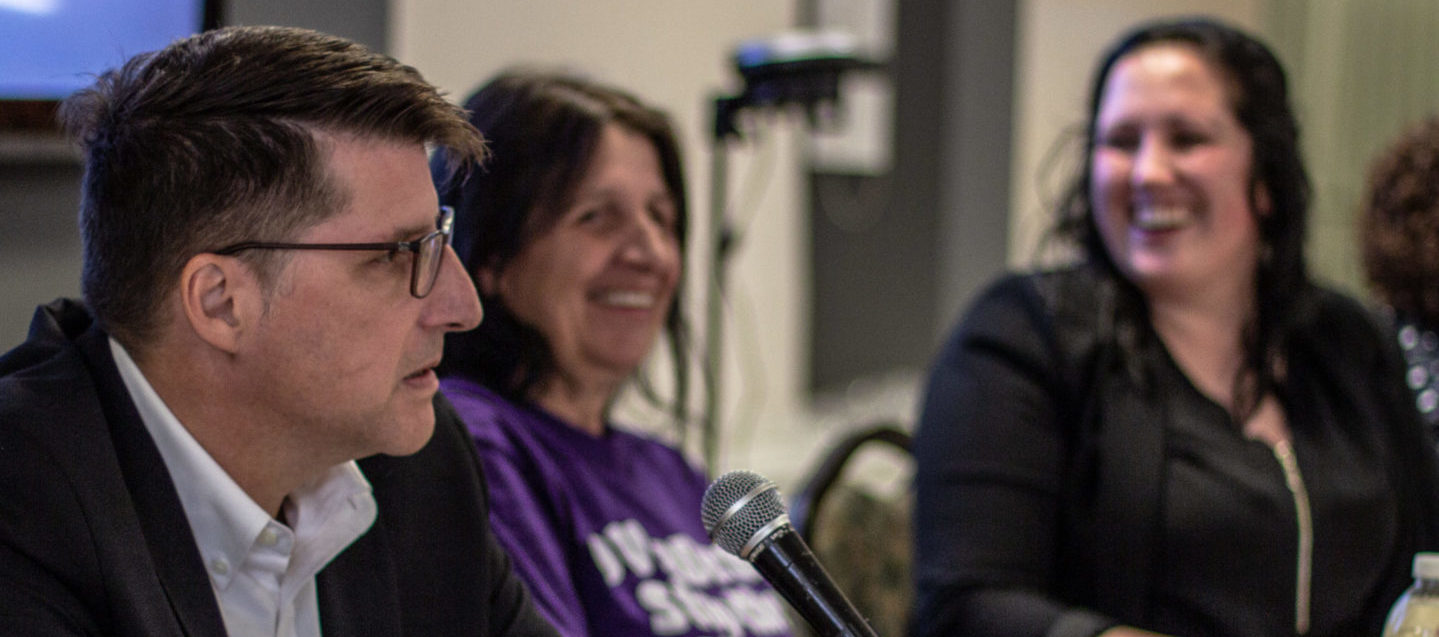Substance Use in our Community: How to Move Forward

by Inspiring Communities staff
Experts and community members came together for a panel discussion of how we can better understand substance use and related issues on the Northside.
Each year organizations like the Ally Centre publish statistics on harm reduction efforts and research on substance use. These highlight the scale of these challenges in Cape Breton.
Between April 1, 2016 and March 31, 2017 the Centre distributed over 600,000 needles, equating to 4.6 needles per person in Cape Breton. Northside Rising’s 2017 infographic provides the Northside figures. They are even worse with 92,700 needles distributed, equaling 7 needles per Northside resident. Overdose rates are also higher than other communities in Atlantic Canada.
Other research points to an accepted culture of heavy drinking and a huge lack of support and services for mental health issues, much of which stems from high incidences of trauma and abuse.
Beyond the numbers, the qualitative research undertaken by the Ally Centre and others speaks of the pain, humiliation, and worry suffered by people who use drugs as they try to navigate ‘the system’ for help. Much of these issues stem from the stigma, misunderstanding and systemic barriers they face.

Northside Rising planned three events in Spring 2019 to educate the community about the root causes of these realities. Folks came together for a panel discussion at a fourth and final event. Between 60-100 people attended each event, making the Rising Tide Festival Northside Rising’s most significant community engagement success to date. Topics covered at the panel ranged from healthcare and mental health services, family supports, community connections, and a history of intergenerational trauma in the Northside.
Panelists at the event hosted by CBC Radio’s Steve Sutherland included:
- Dr Margaret Dechman (Professor, L’nu, Political, & Social Sciences, Cape Breton University)
- Dr Edward Michalik (Executive Director, Bonfire: Cape Breton Social Research Centre)
- Emily Donovan (Community Studies Student, Dept. of Community Studies, Cape Breton University)
- Christine Porter (Executive Director, Ally Centre)
- Malcolm Campbell (Recreation Therapist, Caperbase)

One of the main concerns identified at the discussion is the lack of services for mental health in Cape Breton. Lack of health care professionals means people can’t connect with providers quick enough. In addition, stigma in hospitals for substance users and those with mental health needs is still a major problem.
The realities of trauma and abuse being normalized in Cape Breton were another major topic of the evening. Dr. Ed Michalik, said in his presentation that these issues are generally taboo – so raising them to the forefront is a big part of the work of the community. Panel experts talked about how different trauma and abuse can look for everyone. The need to improve coping mechanisms and for local trauma-informed therapists is high in the Northside. Margaret Dechman, CBU professor said that research is needed to better understand the high rates of trauma, along with more collaboration between healthcare providers. For example, paramedics often don’t know where to refer people after an overdose. But people need supports especially in those 48 hours immediately afterwards. An example of a new collaborative interdisciplinary effort that is working well is where nine family physicians on the Northside who are sharing a social worker. Dr. Dechman’s presentation at the Sydney Mines Legion focused on understanding how the brain functions when it is dependent on drugs.
Community connection was another important topic of the evening. Community members discussed the need to see people as people, and create more safe spaces. The energy in the room centred around the need to reach out to people in need, and not wait for them to seek help when isolated or in need.
The Ally Centre is a great community-led example of the importance of connection. Community members have a sense of belonging and safety from peers. There is connection among individuals who’ve been through similar circumstances. People describe feeling supported when they are at the Ally Centre, and not judged no matter where they are at in their lives. The community wants to come together to create more of these spaces, with the vision of ‘Making the whole community a treatment centre.’
The Community Responds

Those who attended the event filled out feedback forms that told us that they liked the diversity in the group that was leading the discussion. Attendees liked that the panel audience held varied philosophies, expertise, and experiences, and all voices were heard.
People appreciated that there was an openness in the room, with dialogue that was solution-focused and honest. The community created a safe space for conversations around substance use to take place.
It gave people an opportunity to see why this [work] matters.
– community member
What did the community walk away with?
Attendees learned (among others):
- How current systems are affecting the community and how important it is for us to come together around these issues.
- About services that are available – options for substance users, new programs they can use or refer people to.
- About our community strength, and how critical it is to come together to support one another to create an environment for healing.
Questions that came up about next steps included: How do we come together to change stigma? Can we develop systems that cross institutional and departmental boundaries – how do we create shared responsibilities?
A strong feeling that a co-created event with community partners would be the most beneficial in this work moving forward.
Panel Discussion – Substance Use in Our Community: How to Move Forward Video
The full discussion is available online: https://www.youtube.com/watch?v=UOQwBWpz4RU
Learn more about Northside Rising.
Share this:
Comments are closed